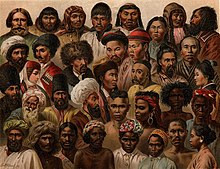Terminology

The term ethnic is derived from the Greek word ἔθνος ethnos (more precisely, from the adjective ἐθνικός ethnikos, which was loaned into Latin as ethnicus). The inherited English language term for this concept is folk, used alongside the latinate people since the late Middle English period.
In Early Modern English and until the mid-19th century, ethnic was used to mean heathen or pagan (in the sense of disparate "nations" which did not yet participate in the Christian oikumene), as the Septuagint used ta ethne ("the nations") to translate the Hebrew goyim "the nations, non-Hebrews, non-Jews". The Greek term in early antiquity (Homeric Greek) could refer to any large group, a host of men, a band of comrades as well as a swarm or flock of animals. In Classical Greek, the term took on a meaning comparable to the concept now expressed by "ethnic group", mostly translated as "nation, people"; only in Hellenistic Greek did the term tend to become further narrowed to refer to "foreign" or "barbarous" nations in particular (whence the later meaning "heathen, pagan"). In the 19th century, the term came to be used in the sense of "peculiar to a race, people or nation", in a return to the original Greek meaning. The sense of "different cultural groups", and in American English "racial, cultural or national minority group" arises in the 1930s to 1940s, serving as a replacement of the term race which had earlier taken this sense but was now becoming deprecated due to its association with ideological racism. The abstract ethnicity had been used for "paganism" in the 18th century, but now came to express the meaning of an "ethnic character" (first recorded 1953). The term ethnic group was first recorded in 1935 and entered the Oxford English Dictionary in 1972. Depending on the context that is used, the term nationality may either be used synonymously with ethnicity or synonymously with citizenship (in a sovereign state). The process that results in the emergence of an ethnicity is called ethnogenesis, a term in use in ethnological literature since about 1950. The term may also be used with the connotation of something exotic (cf. "ethnic restaurant", etc.), generally related to cultures of more recent immigrants, who arrived after the dominant population of an area was established.
Depending on which source of group identity is emphasized to define membership, the following types of (often mutually overlapping) groups can be identified:
- Ethno-linguistic, emphasizing shared language, dialect (and possibly script) – example: French Canadians
- Ethno-national, emphasizing a shared polity or sense of national identity – example: Austrians
- Ethno-racial, emphasizing shared physical appearance based on genetic origins – example: African Americans
- Ethno-regional, emphasizing a distinct local sense of belonging stemming from relative geographic isolation – example: South Islanders of New Zealand
- Ethno-religious, emphasizing shared affiliation with a particular religion, denomination or sect – example: Jews
In many cases, more than one aspect determines membership: for instance, Armenian ethnicity can be defined by citizenship of Armenia, native use of the Armenian language, or membership of the Armenian Apostolic Church.
Comments
Post a Comment